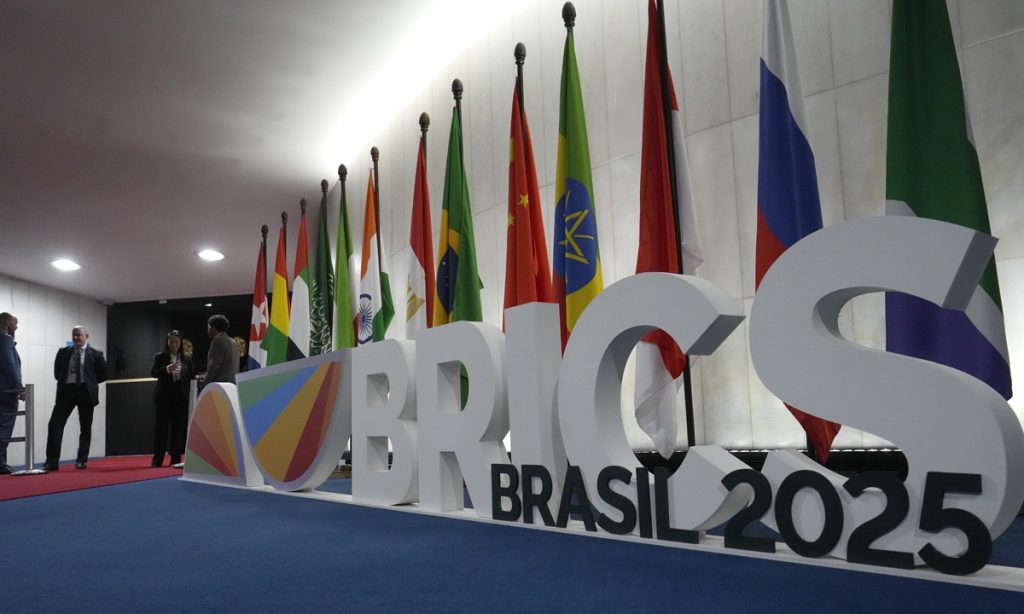China vows to advance high-quality development of greater BRICS cooperation

Premier of the State Council Li Qiang will attend the 17th BRICS Summit upon invitation in Rio de Janeiro, Brazil from July 5 to 8, Chinese Foreign Ministry spokesperson Mao Ning announced at a regular press conference on Wednesday.
When asked about China's expectations for the BRICS Summit, Mao said the BRICS cooperation mechanism offers the most important platform for the solidarity and cooperation among emerging markets and developing countries in the world. It's an important force for realizing an equal and orderly multipolar world and a universally beneficial and inclusive economic globalization.
Mao noted that this will be the first summit after the new member Indonesia, and 10 partner countries joined BRICS. Multiple emerging markets, developing countries, and international and regional organizations are invited to the summit.
China looks forward to working with all parties to consolidate the BRICS strategic partnership, make due contributions to safeguarding multilateralism, promoting common development and improving global governance, and advance the high-quality development of greater BRICS cooperation, Mao added.
Initially comprised of Brazil, Russia, India, China, and South Africa, the recently expanded BRICS now also includes Egypt, Ethiopia, Indonesia, Iran, Saudi Arabia, and the United Arab Emirates, according to the official BRICS 2025 website. The grouping has evolved into a platform for South-South cooperation and political coordination.
Based on the Johannesburg Declaration, the 2024 Kazan Summit approved the creation of a BRICS partner country category, which now includes Belarus, Bolivia, Cuba, Kazakhstan, Malaysia, Nigeria, Thailand, Uganda, Uzbekistan, and most recently, Vietnam.
Experts noted that the expanded format reflects BRICS' rising capacity to represent the Global South. This year's meeting is expected to offer broader representation and a stronger voice for developing nations amid challenges to multilateralism and international cooperation, they added.
"This summit marks the first full gathering of the '11 members+10 partners' BRICS family. Within this new system, developing countries will no longer be the silent majority but a vital force in global governance," Wang Youming, Director of the Institute of Developing Countries at the China Institute of International Studies, told the Global Times on Wednesday.
Growing voice
The inclusion of Indonesia as a full member and Vietnam as a partner country further strengthens BRICS' representativeness and influence. The enlarged grouping spans Asia, Africa, Latin America, and the Middle East, representing nearly half of the global population and about 30 percent of global GDP, contributing over 50 percent of global economic growth, according to an article published on People's Daily Wednesday.
''Joining BRICS cooperation is good for Vietnam's development and the common interest of BRICS countries and the Global South. Having a new partner country in the BRICS family symbolizes the BRICS' growing representativeness, appeal and impact,'' Chinese Foreign Ministry spokesperson Guo Jiakun said on June 16.
China stands ready to work with other BRICS members and partner countries for a closer and more all-round, result-oriented and inclusive partnership, advance high-quality greater BRICS cooperation, and contribute more to defending multilateralism and global fairness and justice and advocating common development, Guo added.
Ali El-Hefny, Vice President of the Egypt-China Friendship Association and former Egyptian Deputy Foreign Minister, noted BRICS' increasing influence and its critical role in promoting South-South cooperation and common development, the People's Daily reported.
Against a backdrop of frequent geopolitical conflicts and disruptions to the international trade order, BRICS' role in articulating the voice of developing nations has never been more critical, Wang said.
"From the perspectives of economic scale, population, and political representation, BRICS surpasses regional groupings like the G7. It is therefore vital for BRICS to speak with one voice in confronting trade protectionism, geopolitical tensions, and climate change," Wang added.
On June 24, BRICS issued a Joint Statement on the Escalation of the Security Situation in the Middle East Following the Military Strikes on the Territory of the Islamic Republic of Iran, calling on all parties to use existing channels of dialogue and diplomacy, with a view to de-escalate the situation and resolving their differences through peaceful means, which according to experts, demonstrates BRICS' unified voice on global peace and governance.
Emerging challenges
The 2025 summit is also expected to address key global issues, including the governance of artificial intelligence (AI). According to the BRICS official website, the bloc seeks to improve the legitimacy, equity in participation, and efficiency of global institutions such as the UN, IMF, World Bank, and WTO, while bolstering sustainable social and economic development and promote social inclusion, said the BRICS website.
Brazil, as the current BRICS Chair, has outlined two strategic priorities: Global South Cooperation and BRICS Partnerships for Social, Economic, and Environmental Development. According to the International Institute for Sustainable Development, Brazil's agenda includes six key areas: global health, trade and finance, climate change, AI governance, peace and security, and institutional development.
Chen Fengying, a research fellow at the China Institutes of Contemporary International Relations, told the Global Times on Wednesday that green development, green finance, and AI will be key areas of discussion during the summit.
"On the future of emerging industries, the Global South will establish its own rules and voice. BRICS will play a pivotal role, with China, as a leading player in these sectors, expected to take the lead," Chen said.